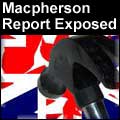|
The
Left’s War On Britishness
By Anthony Browne - The Spectator - July 2005
The terrorist attacks of
7 July, as the ludicrous BBC refuses to call them,
have raised many questions. We might ask what turned
ordinary Muslim youths into mass murderers.
Or we might wonder how a religion of peace can inspire
people to terrorism across the world.
A more pressing
question, however, is: why Britain? Not why was
Britain attacked, because the list of countries
targeted by Islamist terrorism is growing so fast
it will soon be quicker to list those unaffected.
But rather:
why
did Britain become the first country in the developed
world to produce its own suicide bombers?
Why is Britain just about the only country
in the world to have produced suicide bombers who
sought to kill not another people but their fellow
citizens? Italy, Denmark, the Netherlands and Poland
were all part of the war on Iraq, and have not produced
suicide bombers. The US and Spain had to import
their terrorists. For those who think that Muslims
in Britain are particularly oppressed and poor,
try visiting Muslims in France or Italy.
For all
our concern about Islam, Britain is one of the least
Islamic countries in Western Europe. There are more
Muslims, as a percentage of the population, in France,
Germany, the Netherlands, Belgium and Denmark. It
is true that Britain, more cursed with political
correctness than most, has shown a joyfully optimistic
tolerance of Islamic extremists. The BBC, the Guardian
and the Metropolitan Police promote groups like
the Muslim Association of Britain, even though it
openly supports terrorism (just not in Britain).
No,
the real answer to why Britain
spawned people fuelled with maniacal
hate for their country is that
Britain hates itself.
In hating Britain, these British
suicide bombers were as British
as a ....
police warning for flying the
union flag.
|


|
|
|
 |
 |
 |
Quietly
Destroying

The
White Race |
|
Lecturer
Dr Frank Ellis

Sovietization
Of - UK |
|
|
Britain’s
self-loathing is deep, pervasive and lethally dangerous.
We get bombed, and we say it’s all our own fault.
Schools refuse
to teach history that risks making pupils proud, and use
it instead as a
means
of instilling liberal guilt.  |
 |
The government and the BBC gush over ‘the other’,
but recoil at the merest hint of British culture.
The only thing we are licensed
to be proud of is London’s internationalism —
in other words, that there is little British left about
it.
| It wasn’t always
like this. The Great Exhibition in 1851 and the Festival
of Britain a century later both unashamedly celebrated
Britain’s achievements, fuelling an infectious
sense of pride in being British. But then the Left and
the multiculturalists waged an intolerant war of attrition
against British identity and social cohesion, culminating
in a report by New Labour’s Lord Parekh calling
for Britain to become a ‘community of communities’.
By 2000, the best Britain could come up with for the
Millennium Dome was an embarrassing display of giant
lice in giant pubic hair. But self-loathing in a nation,
like self-loathing in an individual, is alienating.
Someone who despises himself inspires greater contempt
than affection, and a country that hates itself cannot
expect its newcomers to want to belong. |
|
Only in the last few
years has it dawned on the government how dangerous the
Left’s war on Britishness really is. Labour ministers
now queue up to declare that we need a new sense of British
identity.
But the ability to learn
a few sentences in English and a knowledge of how to claim
benefits do not create a national allegiance.
What is needed is something
to make the people who live in these islands feel good about
being British, but the war on Britishness has imposed a
nationwide amnesia about our national story.
The historian Simon Schama
wrote that ‘to collude in the minimisation of British
history on the grounds of its imagined irrelevance to our
rebranded national future, or from a suspicion that it does
no more than recycle patriotic pieties unsuited to a global
marketplace, would be an act of appallingly self-inflicted
collective memory loss’. And as the American philosopher
George Santayana warned, ‘A country without a memory
is a country of madmen.’
Britain is one of the few
countries where it is a source of pride to despise your
country. We are all repeatedly taught the things to be ashamed
of about Britain, but what about the things to be proud
of? The truth is that Britain’s self-loathing is as
unique as it is unwarranted. Britain really is great. These
small rainswept isles off the western end of the vast Eurasian
landmass have contributed far more to the well-being of
the rest of humanity than any other country, bar none.
Sometimes it takes a foreigner
to open your eyes. A Norwegian diplomat told me long ago
that he was taught at school, as British kids aren’t,
that Britain gave the world industrialisation, democracy
and football — its economic system, its political system
and its fun. That is just the start of it. It is true Britain
gave the world its most popular sport — football —
which emerged in the 13th century in the north of England
as a holy day game, and was given the modern rules in 1848
by undergraduates at Cambridge University. But Britain has
also given the world almost every other internationally
played sport. If you can score points by hitting or kicking
something, it was almost certainly invented by Britain’s
leisured classes, keen on exercise, team spirit and clear
rules.
Golf originated in Scotland
in the 15th century. Cricket emerged 700 years ago, and
evolved into the game we have today. The French may have
invented the nearly obsolete real tennis, but the Victorians
created modern tennis. Britain’s rain prompted indoor
tennis, and table tennis was born. Harrow School gave the
world squash; Rugby School gave the world rugby; the Duke
of Beaufort copied the game poona from the Indians and gave
the world badminton; the Marquess of Queensberry took bare-knuckle
pugilism and turned it into modern boxing, complete with
gloves. Every time people play table tennis in China, football
in Brazil, cricket in Pakistan or golf in Japan, they are
enjoying Britain’s gifts to the world. Any other country
which gave organised sport to the world would enjoy it as
a proud part of their national identity; but not Britain.
The one thing we do say
about ourselves is that we are a nation of inventors, but
few of us realise just to what extent. A recent survey by
the Science Museum complained that 58 per cent of Britons
didn’t realise we invented trains, and 77 per cent
didn’t realise we invented jet engines. In fact, we
didn’t just invent railways, but our engineers helped
revolutionise the world by building them across Europe,
the Americas, Africa and Asia. In 1698 the military engineer
Thomas Savery patented the first steam engine (later improved
by James Watt), while in 1821 Michael Faraday invented the
electric motor. In 1876 the Scotsman Alexander Graham Bell
invented the telephone; 50 years later John Logie Baird
demonstrated television; and in 1989 Tim Berners-Lee invented
the internet.
And so it goes on and on
— the traffic light, the electromagnet, the underground
train (which first ran near the site of the Edgware Road
bomb), light bulbs, the pneumatic tyre (thanks, Mr Dunlop),
radar, the steel-ribbed umbrella, the Thermos flask, the
pocket calculator (thanks, Sir Clive), vaccination, penicillin
and cloning (thanks, Dolly).
Britain’s scientists
have done more to unravel the mysteries of nature than any
others. Of the four main forces of nature, Brits unravelled
the mysteries of two — Newton with gravity and James
Clerk Maxwell with electromagnetic radiation. Darwin discovered
evolution by natural selection, while Watson and Crick unpicked
DNA. Of the three planets unknown to the ancients, two were
discovered by the British. Sir William Herschel discovered
Uranus in 1781, while in 1841 the Cambridge maths undergraduate
John Adams, using orbit calculations, discovered Neptune
(beating a French rival by a few months). Britain is second
only to the US in the number of Nobel prizes it has won
— twice as many as France and seven times as many as
Italy and Japan.
Britain didn’t just
give the world industrialisation, but the belief in economic
and political liberty, in free markets and democracy, leading
to the modern world’s unprecedented affluence and freedom.
Adam Smith, John Locke and John Stuart Mill won the arguments,
and Britain’s global influence spread them. Britain
didn’t invent democracy, but matured it over centuries
and ensured that it became dominant.
Britain’s greatest
creations are the US, Canada, Australia and New Zealand,
all stable, affluent, successful liberal democracies which
have for more than a century been a magnet to the rest of
the world. No other European country ever managed such an
achievement. All stayed free of the tyrannies of fascism,
communism and military dictatorship that benighted almost
everywhere else. In the dark days of the second world war,
Britain and its former colonies were just about the only
democracies in existence; now democracy embraces much of
humanity. Of the G8 countries, all but Russia (and arguably
even she) owe their current status as free-market democracies
to Britain and its former colonies. The English-speaking
economies amount to more than a third of world GDP.
With just 1 per cent of
the world’s population, Britain has united the world
with a truly global language, allowing people to speak unto
people for the first time in history (French was little
more than a language for elites). These islands make up
less than a fifth of 1 per cent of the world’s land
area, and yet their capital dictates to the rest of the
world its time zones and degrees of east and west.
Britain’s cultural
influence is far smaller that its scientific and political
influence, but in the written word it is unrivalled. Molière
and Goethe cannot challenge Shakespeare as the world’s
most important writer. More recently, British musicians
from The Beatles to Dido have a global audience unmatched
by those of any country other than its former colony, the
US. Our TV producers increasingly enjoy a similar status
— is there any country that hasn’t yet suffered
Big Brother or Who Wants to be a Millionaire?
Our national story is the
most extraordinary there is. The patriotic French are obsessed
with ‘les Anglo-Saxons’ because they see our achievements
far more clearly than we do ourselves. As Luigi Barzini
asked in The Europeans, ‘How ...did a peripheral island
rise from primitive squalor to world domination?’ Thomas
Sowell, the leading African-American intellectual, wrote
in his epic Conquests and Cultures, ‘Much of the world
today, including the United States, is still living in the
social, cultural, and political aftermath of Britain’s
cultural achievements, its industrial revolution, its government
of checks and balances, and its conquests around the world.’
The
problem for Britain is not that it has too little to be
proud of, but too much.
Multiculturalists warn that history excludes newcomers,
but Britain’s national story is a continuing one that
anyone can join, just as immigrants have joined it in the
past, and as newcomers to the US today get infected by its
self-belief. Through the so-called voluntary assumption
of history, when an immigrant starts thinking of his fellow
countrymen as ‘we’ rather than ‘you’,
he takes on his country’s history as his own.
After helping free
Europe from fascism, Winston Churchill finally published
his History of the English-Speaking Peoples,
a book with so little self-loathing that it is now utterly
unfashionable.
Churchill explained, ‘It is in the hope that the contemplation
of the trials and tribulations of our forefathers may not
only fortify the English-speaking peoples of today, but
also play some small part in uniting the whole world, that
I present this account.’
Today, the need for such a
self-confident national story is as great as ever.
We have tried the alternative, and seen its deadly consequences.